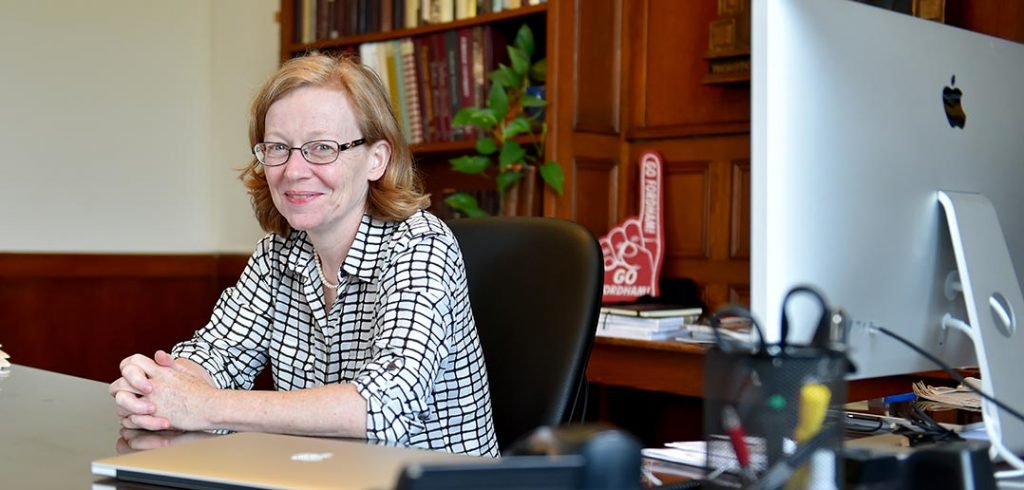As someone who majored in both mathematics and anthropology as an undergraduate, Maura Mast, PhD, has a keen interest in seeing how very different fields can be brought together. Promoting more interdisciplinary research and programs is one of her top priorities as dean of Fordham College at Rose Hill, a job she took over last month.
Mast earned her bachelor’s degree cum laude from the University of Notre Dame and her doctorate in mathematics from the University of North Carolina before joining the faculty of the University of Massachusetts at Boston. A tenured associate professor of mathematics at the university since 2002 and an active researcher in the area of differential geometry, she has won numerous awards for teaching and is a nationally recognized expert in the field of quantitative reasoning. She has held leadership roles with the Association for Women in Mathematics, the Joint Committee on Women in the Mathematical Sciences, and the Special Interest Group of the Mathematical Association of America on Quantitative Literacy. She is deeply committed to Catholic higher education, which she focused on as a fellow of the American Council on Education in 2012-2013.
Over the past six years, while serving as associate vice provost for undergraduate studies and then as special assistant to the provost at UMass Boston, she helped establish worldwide educational partnerships and worked with deans and faculty to expand and enhance academic programs. She is co-author of a textbook, Common Sense Mathematics, to be published by the Mathematical Association of America this year.
Why did this position appeal to you?
Fordham as a university has a really robust mix of schools and disciplines, with arts, humanities, social science, science, and mathematics all in the same college at Rose Hill. That structure appealed to me because of the way I approach pedagogy and scholarship. Part of it is my background; in college, I was what was called a liberal arts math major, so I was able to add a major in anthropology. I had this nice mix of arts and letters and sciences, and I was able to find a way to make them come together, which I think is a very valuable thing to be able to do. When you study two very different fields at once, it challenges you in a different way than if you study two fields that are closely aligned.
How would you like to apply this experience at Fordham?
There are some great interdisciplinary programs here, like integrative neuroscience, and I’d love to work with faculty to see what others might make sense. And then, how do we talk to students to say, ‘You have this major but here’s a minor that might be really interesting and might be a really nice complement to that major.’ How can you find those connections? Part of it is how do you say to students, ‘Take a risk. Take a course you wouldn’t ordinarily have taken and be open to where that leads you.’ We have to make sure they know that they have incredible options here. And as I talk to faculty members about their research, my hope is that I’ll see opportunities to bring people from different fields together.
What do the liberal arts have in common with mathematics?
In ancient Greece, mathematics was closely linked to philosophy. And if you think about philosophy, you think about theology, those are ways to understand the world. I’ve spent a lot of time with this group of lay and Jesuit mathematicians called the Clavius group; this is a group that very much says, ‘We see God through mathematics,’ in a way that others may see God through art or music. There’s an aspect of mathematics that is beautiful. When you do a mathematical proof, when you find a result, there is a beauty to that.
What are some of your other plans, both short- and long-term?
My first order of business is to get to know the college, its strengths, and what people think we should be doing better. I know that the previous dean did a tremendous job of building the undergraduate research program. That’s something that we need to continue to invest in, and we need to find a way to build out and institutionalize. We’ve got real strengths in international education, and there’s a lot of potential to increase the capacity for this and encourage more students to take a global approach to their education. What I want to do is understand the landscape and the international opportunities for all students. What alternatives can we offer students in pre-health or STEM (science, technology, engineering, mathematics) fields, who have a more rigid curriculum? Is it a spring break, is it a short-term summer trip? And how can we use the fact that New York City is a global city in our approach to international education?
How will your Catholic faith guide your work as dean?
I think it’s important to have a dean who is a strong advocate for the Jesuit, Catholic tradition and who can speak to how it can be a tremendous force for good. I find Jesuit spirituality to be very compelling, and I like being at a place that takes that very seriously. I think the Jesuit approach is a great one because it appeals to people of different faith traditions, so we can have those dialogues in open and comfortable ways. That’s part of what I want to support.

